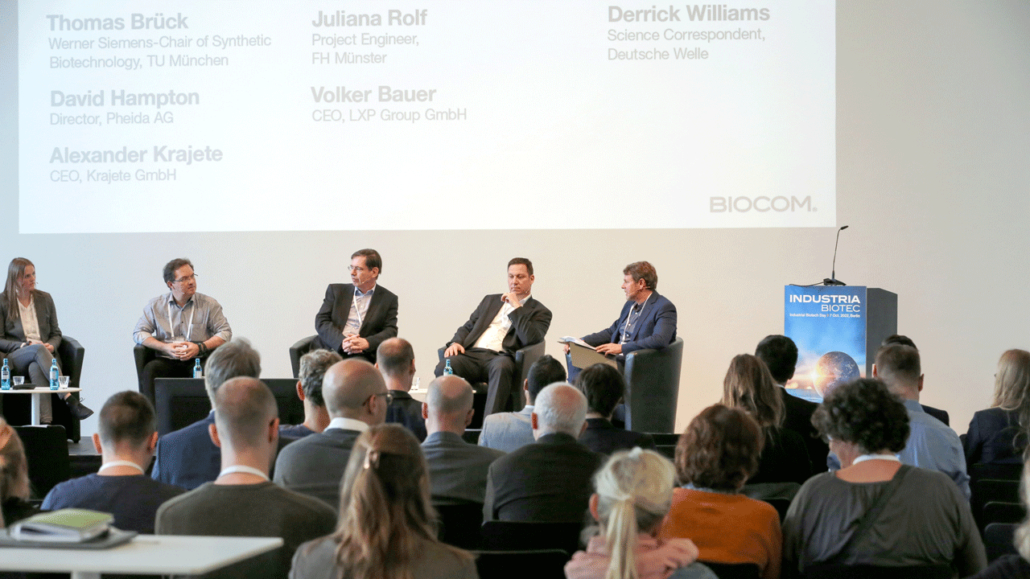
Experts showcase next-gen biotech solutions to climate crisis
Industry experts have presented the latest biotech solutions for tackling climate change at the first INDUSTRIA BIOTEC conference, Europe's new forum for the industrial biotech sector.
Last Friday in Berlin, dozens of experts presented some of the latest potential biotechnological solutions at the INDUSTRIA BIOTEC conference. Against the backdrop of the looming climate catastrophe, those solutions have increasingly become vital pieces of the puzzle in the race to a zero-carbon future.
In a total of five thematic panels – Energy, Chemistry, Waste Cycles, Food and Finance – the experts looked at how microbial and enzyme-based fermentation solutions complement the still mostly agricultural bioeconomy approaches and green chemistry for decarbonising industrial production. On the evening of the first day of the conference, French food company Standing Ovation won the start-up pitch competition.
The Energy panel highlighted synthetic biology approaches and novel bioprocesses that have the potential to change the sector in a sustainable way. Its experts discussed advances in second- and third-generation biofuels, gas-fermenting microbes that produce methane, and opportunities for scaling up microbial biohydrogen production without electrolysis. They also made it clear that the problems in the area have less to do with a lack of technical solutions, and more to do with acquiring financial resources for scaling up and the political will to go “bio” in the field.
In the Chemistry panel, the challenges that face this industrial sector grew clear. A major one is that while the chemicals industry is aiming for fossil-free production, the most common chemicals and materials cannot be decarbonised or replaced by alternatives. Greater attention must therefore be paid to non-fossil alternative carbon sources – such as biomass or carbon dioxide – where biotechnology can make important contributions.
The expert panel on Waste provided a fitting follow-up to the discussion on industrial transformation. In it, a series of presentations showcased examples of sustainable process solutions based on biotechnology and made it clear that the term “waste” is now obsolete and inaccurate. The new paradigm is recycling – and thus value creation and a true circular economy – precisely in the area that is usually viewed as the end of a product’s life cycle. Highlights of the panel included visions and practical examples in the transformation of previous industrial processes, up to the “replication” of photosynthesis to obtain new biomaterials.
In the round on New Foods, one topic was precision fermentation from the laboratory, which could overcome a host of existing problems in current agriculture and livestock breeding settings and reduce their large contribution to greenhouse gas emissions. It also looked critically at the ways we currently use land, as well as the use of antibiotics in animals. If we were to stick to traditional food production, the latter will only increase as the global population grows. However, the speakers also agreed that no single path or solution could resolve the complex interconnections of world food supply, a rise in meat consumption, drinking water contamination by pesticides and over-fertilisation, small farmers vs. large farms, global supply chains and climatic regional challenges. One expert made it clear that in so-called developing countries, even small improvements directly in the field can often have a big impact.
Despite the wide range of innovations and ideas discussed and presented by six start-ups in an exciting pitch round the first evening, the firms had one thing in common. All of them were on the lookout for more money. The panel on “Capital/Financing” however, which was led by the largest fund investing in the circular economy (ECBF), didn’t dwell on complaints, but instead reached a consensus that now is a very good time to invest in climate-friendly technologies and new visionary approaches – especially because of the looming crises. “The opportunities are gigantic, said one panel member. And no investor in his right mind should miss them.”
A detailed report on the conference, which was organised by BIOCOM AG, will be available in the upcoming European Biotechnology magazine


 Immunic/Nela Dorner
Immunic/Nela Dorner
